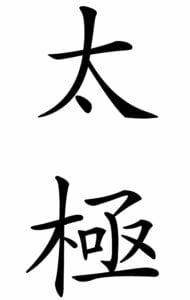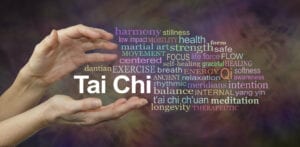
Many people have difficulty sleeping, and the difficulty seems to increase as we age. Difficulty sleeping can come from stress, anxiety, and not feeling tired at night.
Exercise is a well-known antidote for these issues. When we exercise, our body releases endorphins which interact with our brain receptors to reduce pain and trigger positive feelings. This leads to reduced stress, anxiety, and depression.
Plus, exercising burns calories and puts your body in a state where it needs sleep to recover from the hard work you’ve been doing.
For a myriad of reasons though, be it age or physical shape or simply time in the day, many people find it difficult to exercise. For these people, doing tai chi for reduced stress and better sleep might be the answer.
What is tai chi?

Tai chi is a form of Chinese martial arts well known for its low impact movement and mindfulness.
Although the modern form of tai chi emerged in the mid-1800s, the movements and practices that it builds on have been practiced in China for around 2,000 years.
Originally developed for self-defense, tai chi has evolved into a martial art that is about combining movement and meditation working and syncing both body and mind.
What benefits does tai chi have for your body?
Just because it’s touted as a low-impact, gentle exercise though, don’t underestimate the physical impact of tai chi. When practicing tai chi, you keep your body in constant motion by flowing from one position to the next.
What gives it the impression of being easy or not working your body hard is the low impact quality of the workout. Most aerobic exercises, like running, jump rope, and even walking put stress on your muscles and joints as your feet impact the ground. Tai chi, on the other hand, puts minimal stress on muscles and joints, making it easier on your body and easier for all kinds of people to participate in.
All forms of aerobic exercise, including tai chi, have been shown to decrease the rate of mortality for those who exercise regularly, according to a study published in the American Journal of Epidemiology.
Tai chi has additional benefits to other forms of aerobic exercise though. A study published in the Journal of Rheumatology has shown that after practicing tai chi for 12 weeks, patients with osteoarthritis had improved symptoms and balance.
The other side of tai chi, and one of the most helpful for sleep, is the meditative side. During your tai chi workout, you practice deep breathing and relaxing your mind. This brings your body and mind into harmony, adding calm and peace and reducing stress and anxiety. For this reason, it has been called an internal martial art, and is excellent for helping you sleep.
Mindfulness meditation has been shown in several studies to reduce stress, anxiety, and even lower blood pressure. The beneficial effects of meditation are improved even more when combined with physical movement, with the movement requiring your brain to be present while focusing on the movements and breathing. A study in the Journal of Sport and Health Science reports that older adults who practice tai chi have improved cognitive function and memory.
How can tai chi improve your sleep quality?
Practicing tai chi for sleep can work wonders due to its dual focus on the body and mind. The physical exercise leads to reduced stress and better quality of sleep, including increasing the time spent in deep sleep and reducing the number of times you wake at night. The mindfulness and meditation practiced during tai chi only boosts these results, lowering anxiety and calming your brain, making it easier to fall asleep and stay asleep through the night.
A study performed by Dr. Michael Irwin and published in 2008 in the journal Sleep, looked at 112 healthy adults aged 59 to 86. The adults were randomly split into two groups, one of which practiced tai chi for 25 weeks while the other took classes in healthy living.
The study reported that the class which practiced tai chi had a significant improvement in sleep quality. Dr. Irwin reported that they fell asleep faster, woke up fewer times during the night, and reported feeling refreshed and rested on awakening. Dr. Irwin went on to say that their overall sleep quality was better, and the amount of sleep that they slept during the night was longer.
Dr. Irwin credited the stress relieving effects of tai chi as a major factor in the success of study participants. The holistic, mind-body approach of practicing tai chi for sleep has been shown over and over again to be a great stress reliever, and it has no undesirable side effects like a sleep medication would.
Who can practice tai chi?
 One of the great things about tai chi for sleep or exercise is that almost anyone can do it. Due to its low impact nature, groups like the elderly or people with disabilities that prevent them from participating in more intense workouts can still do tai chi regularly.
One of the great things about tai chi for sleep or exercise is that almost anyone can do it. Due to its low impact nature, groups like the elderly or people with disabilities that prevent them from participating in more intense workouts can still do tai chi regularly.
If you’re not in that group though, don’t assume tai chi isn’t for you. As we stated earlier, just because it’s low impact, that doesn’t mean it won’t work you hard.
Anyone can benefit from the physical and mental aspects of tai chi. In fact, those who regularly participate in high intensity workouts can find that slowing down and giving their joints a rest can be a welcome addition to their exercise plan.
Is tai chi easy or hard to learn?
While tai chi is great for almost anyone to do, don’t assume that it’s easy. Tai chi is a complex exercise requiring constant movement through a series of positions.
The dual mental and physical aspects can be difficult for some people to do at first. Don’t let that discourage you though. If you keep practicing, you’ll find that, before long, the movements and the meditation will become second nature.
How can you start learning tai chi today?
You can learn tai chi in a number of places. Your city likely has several tai chi classes you can participate in.
Because tai chi doesn’t require any specialized equipment and isn’t dangerous to do on your own, many people can do it at home with the help of books, online courses, or YouTube videos.
So download a YouTube video or a tai chi app on your smartphone to help guide you through tai chi. Make it part of your daily routine to get some needed exercise and to relax you, and to help you sleep better.
If you are normally sedentary though, have a medical condition, or take medications that can make you drowsy, dizzy, or lightheaded, you may wish to check with your doctor before you begin tai chi or any other exercise program.
Final Words
If you have difficulty sleeping or just want a way to reduce stress and anxiety, or if you’re looking for something to increase your physical activity that doesn’t take a lot of time and money, start doing tai chi for reduced stress and better sleep today!
The benefits, both physically and mentally, of this martial art have been proven.
Consider adding tai chi into your bedtime sleep routine. It will help you feel better, happier, calmer, and more peaceful, and it will help you fall asleep faster, stay asleep through the night, and feel better rested in the morning.

6 Responses
Interesting article! I definitely want to fit tai chi into my existing bedtime routine. What is a simple 10 minute tai chi bedtime routine I can do for better sleep?
Thank you, Jane, for reading our article.
Here’s a simple 10-minute Tai Chi bedtime routine that you can do to promote better sleep:
1. Begin by standing with your feet shoulder-width apart, your knees slightly bent, and your arms hanging at your sides. Take a few slow, deep breaths to relax your body and calm your mind.
2. Raise your arms up to shoulder height, with your palms facing down. Slowly rotate your arms in large circles, starting with small circles and gradually increasing the size of the circles. This movement helps to release tension in your shoulders and upper back.
3. Step your left foot out to the side and shift your weight onto your left leg. Slowly lift your right foot off the ground and bring it up to rest on your left calf. Hold for a few seconds, then switch sides. This movement helps to improve your balance and focus your mind.
4. Bring your hands together in front of your chest and slowly raise them up towards the ceiling. As you do so, rise up onto your tiptoes. Exhale and slowly lower your heels back down to the ground as you lower your hands back down in front of your chest. This movement helps to stretch your spine and release tension in your lower back.
5. Shift your weight onto your left leg and slowly lift your right foot off the ground. Rotate your right ankle a few times in each direction, then place your foot back on the ground. Repeat on the other side. This movement helps to release tension in your ankles and feet.
6. Stand with your feet shoulder-width apart and your arms hanging at your sides. Slowly bend forward at the waist and reach towards your toes. Hold for a few seconds, then slowly come back up to standing. This movement helps to stretch your hamstrings and release tension in your lower back.
7. Finish by standing with your feet shoulder-width apart and your arms raised above your head. Take a few slow, deep breaths, then exhale and slowly lower your arms back down to your sides.
This simple Tai Chi routine can help you relax and unwind before bed, promoting better sleep. Remember to move slowly and mindfully, and to focus on your breath as you move through the movements.
Tai chi is a great stress reliever. I do tai chi for about 20 minutes before bed. I truly enjoy the calmness. I am so surprised at how tai chi made me feel so relaxed and calm that I fall alseep right away!
Tai chi is a low-impact exercise with slow, fluid movements that one can do in the comfort of one’s bedroom before bed to relax the body and mind for better sleep. Thank you for sharing your experience with tai chi as an enjoyable, simple pre-bed routine for a good night’s sleep.
Had no idea that Tai Chi could help with sleep. I’ve just checked out a few Youtube videos and I’ve already learned a few things. I like the flow of this type of martial art. It has something special that I enjoy.
Exercise, in general, is very beneficial to helping you fall asleep and stay asleep. Tai Chi is one exercise that has been proven to give you a better night’s sleep. Tai Chi can be done for only 10 minutes. Find time to squeeze 10 minutes of tai chi in your bedtime routine for better sleep!